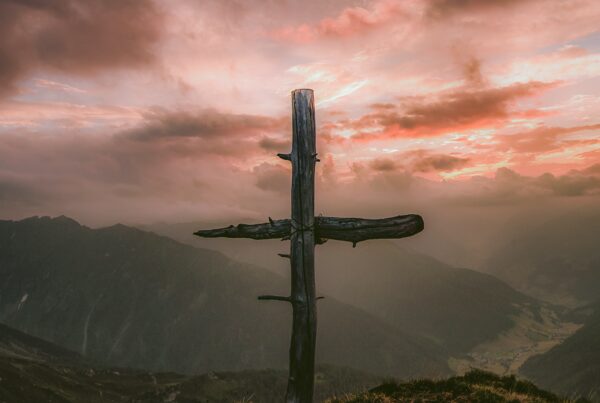I did not grow up observing Lent, but my father did. Every year from March to April, he would call my tios and tias to check in on them while they were abstaining from eating red meat. It was their way of giving up something during this time. Growing up, I remember the smell of seasoned fish flowing from my kitchen and seeing a juicy fried mojarra on the dining table that my mother would prepare for my dad to eat every Friday of Lent. Although my Protestant mother did not observe the Lenten season, she willingly prepared substitute meals for my dad, who identified as Mexican-Catholic (with his whole heart and soul) and aligned with the 40-day fasting Jesus endured in the wilderness. This was my mother’s way of helping my father through his tradition and spirituality. While I never really questioned why we did not join my dad, I do remember hearing this message echoed from our church pulpit at this time, “We are Pentecostal! Jesus did it all. We don’t need to do what Catholics do, when the cross did it all!” Today, regardless of where one stands theologically and traditionally, I want this reflection to be like a fried mojarra for us so we can eat and imagine something more out of this Lent season. I encourage us, and myself included, to not subscribe to polar thinking and instead re-imagine Lent through the lens of a collective spirituality. May we find opportunities to reflect as we walk with Jesus in the wilderness, especially as transient people in our own tired and brown bodies.
Walking Exhausted
I don’t think I have ever worked so hard in my life as I have now as a full-time seminary student, corporate employee, and daughter of immigrant parents. I don’t think I am the only one feeling this way right now. As brown people, our work ethic is a double-edged sword. It is our pride that helps us get things done and our means of survival. Some of us have grown up in homes where work is all our family knows. Some of us have been the first ever to go to college and experience things like FAFSA, credit scores, and final exams, all while working. Others have given up dreams or placed them on a temporary hold to contribute to the family or raise a family. These are the experiences we, as a collective, carry in our DNA.
As I sat among a group of Latina friends in the faith this past weekend, we found ourselves sharing more stories from our communal experience involving our parents in the workforce. Coming from parents who were considered working/low class and exploited, we shared space and named the weight of our mothers as house cleaners, nannies, factory workers, and seamstresses. In this wilderness with Jesus, we are not only coming in tired but we bring with us our families, people, ancestors, and their experiences. We have been tired with our skin accustomed to the windy, dry, and harsh wilderness that is the U.S. economy. Our temptation lies in believing that this exhausted and exploited way of life is all there is for us as children of God.
Beloved Children of God
5 Next the devil led him to a high place and showed him in a single instant all the kingdoms of the world. 6 The devil said, “I will give you this whole domain and the glory of all these kingdoms. It’s been entrusted to me… 7 Therefore, if you will worship me, it will all be yours.”8 Jesus answered, “It’s written, You will worship the Lord your God and serve only him.” (Luke 4:5-8, CEB)
The second temptation Jesus endured in the wilderness tested his position, power, and glory as Son of God. The devil tempted Jesus by giving this false word: glory did not belong to Jesus and Jesus would need to obtain glory and dominion through the devil’s oppressive power. The devil was wrong. Jesus was preparing for his ministry in this wilderness and was already called by God for divine dominion. It would only be a matter of time for Jesus to live out his calling and identity.
For us, our temptation is found in systems challenging our position as beloved children of God. “For us, the most common temptation is not so much thinking too highly of ourselves, as it is accepting the low opinion that others have of us, their definition of our roles, and not trusting the God after whose image we have been created…who will save…the divine image in us.” [1] The lies the devil offers us are not kingdoms, but that our bodies are unloved and worthy only of exploitation. What would it look like for us to disrupt such oppressive powers this Lenten season? What would it look like for us to recognize as a collective, that we are image bearers worthy of equity and flourishment in this economy simply because we are children of God?
Giving Up Lies Spoken Over Our Bodies
Lent gives us, as Brown/BIPOC people, language in our struggle. For just as Jesus was tested in the wilderness, so are we by what the world has said over our very own bodies. Yet, we can walk with the Son of God and lean into what the Spirit is telling us during this time. While the world tests and tempts us here, we must remember to hold onto our identity as beloved children of God. Perhaps in this 40-day period, we find ourselves too tired or weak to sacrifice, but if there is anything we can give up, it must be the lies spoken over our bodies. In this Lenten season, I invite you to let these lies go through the gentleness and kindness of the Spirit towards your body. You may be tired and restless, but Jesus invites you to walk and know that you are beloved and worthy of all that is good.
[1] Justo L. Gonzalez, Luke (Belief: A Theological Commentary on the Bible) (Westminster John Knox Press, 2010), 61.

Born and raised in West LA, Heidi Lepe is a loved mujer by God, community, and familia. She writes, theologizes, and publicly thinks at the intersections of faith, justice, and Latina identity. She is currently pursuing her Masters of Divinity and is the writer behind Shetheordinary, an online platform elevating the Latinx voice at the intersections of faith & cultural identity.
Our lent blog series celebrates the life, death, and resurrection of our liberator. We enter the forty days understanding that it is one of solidarity. Chasing Justice will be guiding our community through the lent with Instagram posts for sharing with friends and guest blogs by BIPOC authors.
The views and opinions expressed on the Chasing Justice Blog are those of the authors and do not necessarily reflect the official policy or position of Chasing Justice. Any content provided by our bloggers or authors are of their opinion and are not intended to malign any religion, ethnic group, club, organization, company, individual or anyone or anything.








